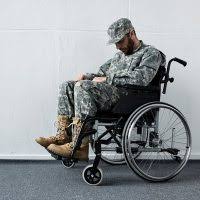Help for Disabled Veterans
Disabled veterans have sacrificed so much for our country, and it is our duty to ensure they receive the help and support they need. Fortunately, there are various programs and resources available to assist disabled veterans in their daily lives.
Veterans Affairs Benefits
The Department of Veterans Affairs (VA) offers a range of benefits for disabled veterans, including disability compensation, healthcare services, vocational rehabilitation, and more. These benefits are designed to provide financial assistance and support for veterans with service-related disabilities.
Assistive Technology
Assistive technology can greatly improve the quality of life for disabled veterans. This includes devices such as mobility aids, hearing aids, adaptive computer equipment, and more. Many organizations provide grants or assistance programs to help veterans access these technologies.
Employment Support
For disabled veterans looking to re-enter the workforce or pursue new career opportunities, there are employment support programs available. These programs offer job training, resume assistance, job placement services, and accommodations in the workplace to help disabled veterans succeed in their chosen careers.
Housing Assistance
Homelessness among veterans is a significant issue, especially for those with disabilities. Various organizations offer housing assistance programs specifically tailored to meet the needs of disabled veterans. These programs provide affordable housing options, rental assistance, and supportive services to help veterans secure stable housing.
Mental Health Services
Many disabled veterans struggle with mental health issues such as PTSD or depression. It is essential for these individuals to receive proper mental health care and support. The VA and other organizations offer counseling services, therapy sessions, support groups, and other resources to help disabled veterans manage their mental health challenges.
In conclusion, there are numerous avenues of help available for disabled veterans. By taking advantage of these programs and resources, we can show our gratitude to those who have bravely served our country.
8 Essential Tips for Supporting Disabled Veterans
- 1. Connect with local veterans’ organizations for support and resources.
- 2. Explore disability benefits and services available through the Department of Veterans Affairs (VA).
- 3. Consider seeking assistance from vocational rehabilitation programs for career guidance and training.
- 4. Look into adaptive housing options to make living spaces more accessible.
- 5. Utilize assistive technology to aid in daily activities and communication.
- 6. Attend support groups or counseling sessions to connect with others facing similar challenges.
- 7. Stay informed about updates in disability rights and legislation that may benefit disabled veterans.
- 8. Don’t hesitate to reach out for help when needed, whether it’s for physical, mental, or emotional support.
1. Connect with local veterans’ organizations for support and resources.
To receive assistance and access valuable resources, disabled veterans can benefit greatly by connecting with local veterans’ organizations. These organizations offer a supportive community where veterans can share experiences, seek guidance, and access a wide range of services tailored to their needs. By engaging with local veterans’ organizations, disabled veterans can find emotional support, financial assistance, job opportunities, housing resources, and more. Building connections with these organizations can help disabled veterans navigate the challenges they face and receive the help they deserve.
2. Explore disability benefits and services available through the Department of Veterans Affairs (VA).
One crucial tip for disabled veterans is to explore disability benefits and services offered by the Department of Veterans Affairs (VA). The VA provides a range of support programs, including disability compensation, healthcare services, vocational rehabilitation, and more, tailored to assist veterans with service-related disabilities. By tapping into these resources, disabled veterans can access financial assistance and specialized care to help improve their quality of life and overall well-being.
3. Consider seeking assistance from vocational rehabilitation programs for career guidance and training.
Consider seeking assistance from vocational rehabilitation programs for career guidance and training. These programs are specifically designed to help disabled veterans navigate their career paths and acquire the necessary skills for employment opportunities. By participating in vocational rehabilitation, disabled veterans can receive personalized support and training tailored to their individual needs, ultimately empowering them to achieve success in their chosen careers despite any challenges they may face.
4. Look into adaptive housing options to make living spaces more accessible.
One crucial tip to assist disabled veterans is to explore adaptive housing options to enhance the accessibility of their living spaces. By considering modifications such as wheelchair ramps, grab bars, wider doorways, and other adaptive features, disabled veterans can create a safer and more comfortable environment tailored to their specific needs. These adjustments can significantly improve their quality of life and independence within their homes, ensuring they can navigate their living spaces with ease and confidence.
5. Utilize assistive technology to aid in daily activities and communication.
Utilizing assistive technology can be a game-changer for disabled veterans, offering invaluable support in daily activities and communication. From mobility aids to communication devices, assistive technology can enhance independence and quality of life for veterans with disabilities. By incorporating these tools into their daily routines, disabled veterans can navigate challenges more easily and stay connected with others, empowering them to lead fulfilling lives despite their unique circumstances.
6. Attend support groups or counseling sessions to connect with others facing similar challenges.
Attending support groups or counseling sessions can be invaluable for disabled veterans, providing them with a safe space to share their experiences and connect with others who are facing similar challenges. These sessions offer a sense of community and understanding that can help combat feelings of isolation and provide emotional support. By participating in these groups, disabled veterans can build a network of peers who can offer empathy, encouragement, and valuable insights on coping strategies, ultimately fostering a sense of camaraderie and resilience in navigating their unique circumstances.
7. Stay informed about updates in disability rights and legislation that may benefit disabled veterans.
It is crucial for individuals to stay informed about updates in disability rights and legislation that may benefit disabled veterans. By staying up-to-date with changes in laws and regulations, individuals can advocate for improved benefits and support for disabled veterans. Being aware of new developments in disability rights ensures that disabled veterans receive the assistance and resources they deserve, ultimately contributing to a more inclusive and supportive environment for those who have served our country.
8. Don’t hesitate to reach out for help when needed, whether it’s for physical, mental, or emotional support.
When it comes to supporting disabled veterans, it is crucial to remember tip number 8: Don’t hesitate to reach out for help when needed, whether it’s for physical, mental, or emotional support. Veterans facing disabilities may encounter various challenges that can be overwhelming at times. By seeking assistance and support from available resources, veterans can receive the care and guidance necessary to navigate these difficulties effectively. It is essential for disabled veterans to know that reaching out for help is a sign of strength and courage, and there are numerous organizations and programs ready to provide the support they need.



